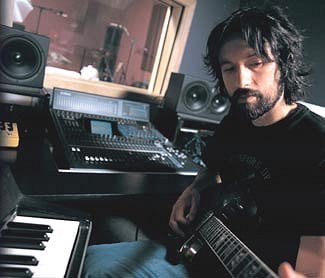Producer Justin Stanley Adds 02R96 To The Mix
|
BUENA PARK, CA (August 15, 2003) Ask producer Justin Stanley to take sides on the digital vs. analog debate, and he'll give you an unusually sensible answer. "It's all about getting your ideas down freely without technology getting in the way," he says. "Analog definitely has a 'sound,' and the subject will always be debated. The most important thing is accessing creativity as easily as you can."
Stanley, whose recent accomplishments include critically acclaimed records by The Vines, Nikka Costa and the Blue Crush soundtrack, explains, "By now everyone's realized how far digital recording technology has come, especially with 96kHz. You can process digital sound and end up with an analog-type sound. The real 'organicness' comes from how you approach recording how you put the music down rather than the actual recording equipment."
To capture this organic feeling, Stanley strives to follow the artist's lead. "I think it's important to listen to the people you're working with and understand what makes them tick," he explains. "With some musicians, like the Vines, you just let them do their thing and try to keep up. I've got my studio arranged so everything's set up, mic'd, and ready to go. If someone wants to jump on the drum kit that second, for example, it's already mic'd up, and we can throw it down." With other artists, the emphasis is on musical exploration. "Working with Nikka [Costa] involves a lot of experimentation," he says. "She likes to go where she's never gone before, so we try every song three or four different ways, from a ballad to the funkiest thing you've ever heard, just to see what works best. I try to follow the artist's path rather than being the producer who's trying to control everything." On the technical side, Stanley is enthusiastic about recent improvements in the sound quality of digital audio. "I've been tracking at 96kHz on a Yamaha 02R96, and I can definitely hear a difference," he notes. "It sounds tighter, with a sweeter top end. The sound feels more dimensional. I had recorded some stuff at 24/44.1kHz, and redid it at 96kHz, and there was a real difference in the sound quality, especially with the acoustic instruments. The air around them and the depth of the sounds themselves were significantly improved. When the original 02R came out, I was blown away. But at that time I was really into the analog side of things, and I didn't have an opportunity to play around with it. But now, with the 02R96, it's amazing. I like the mic preamps a lot, and the onboard EQ isn't too harsh. It's very subtle, so you can tweak things just a little bit. Same with the compressors I can use them just to hold things together, without necessarily slamming them. "I'm not really technical," he adds. "I'm not the kind of person who likes to dive into the manual. I want it all in front of me. With the 02R96, all the controls are right there it's easy to use, and I can just throw things down. For someone who hasn't come up being an engineer and the technical side of things, it's pretty straightforward." Stanley started out as a performing musician, playing guitar and keyboards with the Australian group Noiseworks, and his production style is clearly influenced by the knowledge of what it's like on the other side of the glass. "I've worked with some great producers who have come up from being engineers, and they've come up with amazing ideas," he says. "But what I bring to production is and I know this sounds corny a loyalty to the musicians. I really want them to win to feel their creative dream and have a great time. As a musician, I've gone through the experience of having a producer sitting on the couch, watching the football game on the TV while he's speaking to the band in the control room. That's not the way to do it. You have to be a lot more connected with the music." For more information on the 02R96, write Yamaha Corporation of America, Professional Audio, P.O. Box 6600, Buena Park, CA 90622; telephone (714) 522-9011 or e-mail infostation@yamaha.com. Related Links: 02R96
|


